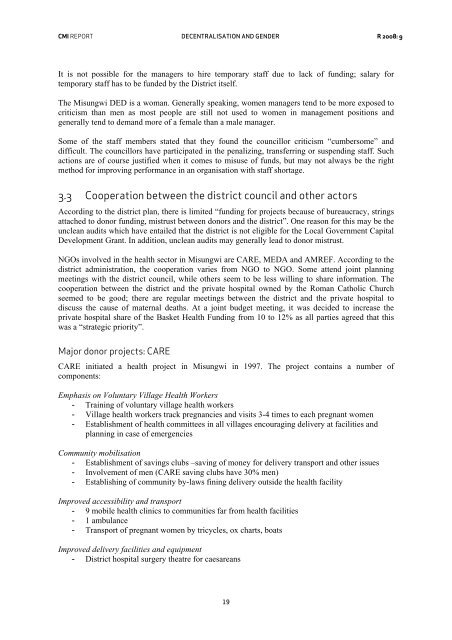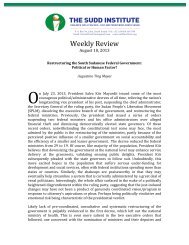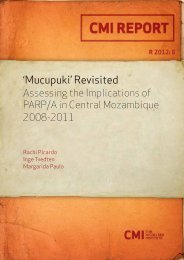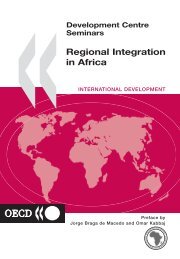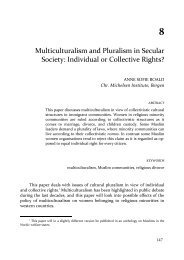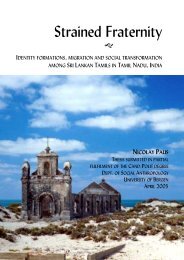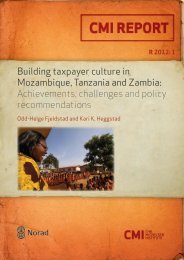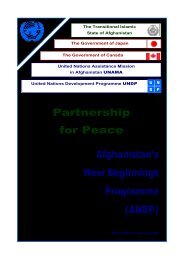Download (pdf) - CMI
Download (pdf) - CMI
Download (pdf) - CMI
You also want an ePaper? Increase the reach of your titles
YUMPU automatically turns print PDFs into web optimized ePapers that Google loves.
<strong>CMI</strong> REPORT DECENTRALISATION AND GENDER R 2008: 9<br />
It is not possible for the managers to hire temporary staff due to lack of funding; salary for<br />
temporary staff has to be funded by the District itself.<br />
The Misungwi DED is a woman. Generally speaking, women managers tend to be more exposed to<br />
criticism than men as most people are still not used to women in management positions and<br />
generally tend to demand more of a female than a male manager.<br />
Some of the staff members stated that they found the councillor criticism “cumbersome” and<br />
difficult. The councillors have participated in the penalizing, transferring or suspending staff. Such<br />
actions are of course justified when it comes to misuse of funds, but may not always be the right<br />
method for improving performance in an organisation with staff shortage.<br />
3.3 Cooperation between the district council and other actors<br />
According to the district plan, there is limited “funding for projects because of bureaucracy, strings<br />
attached to donor funding, mistrust between donors and the district”. One reason for this may be the<br />
unclean audits which have entailed that the district is not eligible for the Local Government Capital<br />
Development Grant. In addition, unclean audits may generally lead to donor mistrust.<br />
NGOs involved in the health sector in Misungwi are CARE, MEDA and AMREF. According to the<br />
district administration, the cooperation varies from NGO to NGO. Some attend joint planning<br />
meetings with the district council, while others seem to be less willing to share information. The<br />
cooperation between the district and the private hospital owned by the Roman Catholic Church<br />
seemed to be good; there are regular meetings between the district and the private hospital to<br />
discuss the cause of maternal deaths. At a joint budget meeting, it was decided to increase the<br />
private hospital share of the Basket Health Funding from 10 to 12% as all parties agreed that this<br />
was a “strategic priority”.<br />
Major donor projects: CARE<br />
CARE initiated a health project in Misungwi in 1997. The project contains a number of<br />
components:<br />
Emphasis on Voluntary Village Health Workers<br />
- Training of voluntary village health workers<br />
- Village health workers track pregnancies and visits 3-4 times to each pregnant women<br />
- Establishment of health committees in all villages encouraging delivery at facilities and<br />
planning in case of emergencies<br />
Community mobilisation<br />
- Establishment of savings clubs –saving of money for delivery transport and other issues<br />
- Involvement of men (CARE saving clubs have 30% men)<br />
- Establishing of community by-laws fining delivery outside the health facility<br />
Improved accessibility and transport<br />
- 9 mobile health clinics to communities far from health facilities<br />
- 1 ambulance<br />
- Transport of pregnant women by tricycles, ox charts, boats<br />
Improved delivery facilities and equipment<br />
- District hospital surgery theatre for caesareans<br />
19


